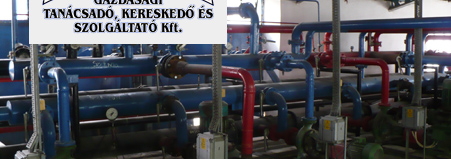At the end of the 70's the oil price boom accelerated the search for alternative non-fossil based energy sources. One of those alternative energy sources was thermal water, from which the temperature of the ground can be utilized. In Hungary, because of its position within the Carpathian basin, this type of energy source is widely available. Development was supported by the government during the 80's, when it gave a grant to promote the use of thermal energy instead of fossil fuels. Its use was also made widely available as many abandoned sinking wells (drilled during the search for natural gas and oil) were converted with little effort to thermal wells. The thermal heating systems running today are mainly based on these type of wells.
The use of thermal heating is concentrated on agricultural activities like heating of greenhouses, sheds for animal keeping, mushroom growing facilities, seeds/ spices/ herbal plant drying rooms and other buildings. In some of these buildings, out of season vegetables and flowers are being grown. Today, after joining the EU and its market, farmers who use this type of technology can be competitive with products coming from the Mediterranean countries.
The view on using thermal water has been controversial from the beginning. The opposition emphasising the need for environmental protection. It's a fact that thermal water contains high levels of salt, in some areas phenol can be found and the need of oxygen is high. The storage of exploited water, after a certain period, can only be done in rivers (Tisza, Körös, Maros), in-which the habitat can be endangered by waste thermal water, according to claims from the opposition. And the improper use of thermal water can cause contamination/ pollution in the temperature. Also in their opinion, the percolation of thermal water into the ground can damage the water-table under the surface.
The supporters list a lot of points regarding energy, economics and nature reservation to prove their theory. Firstly, to cool 1.0 m3 thermal water we would achieve the same amount of energy as if we burn 6.0 m3 natural gas. Because of that by using thermal water we can save a lot of natural gas. The price of thermal energy obtained from thermal water is similar to the price of natural gas but it's cheaper and more economic to use. In contrast with the use of natural gas, there are no gases polluting the air (carbon dioxide, carbon monoxide). There are quotas regarding the amount of polluting gases a country can produce and it is regulated by international agreements.
Both sides agree on the fact that with our present technical abilities, the cleaning of thermal water cannot be managed economically.
Results of reliable, scientific research haven't yet supported the theory behind the damaging effects of thermal water (on the surface, water tables under the ground, flora and fauna). In recent years the Inspectorate for Environmental Protection obligated the users of thermal water to have these types of tests done. The inspections haven't finished yet so final results are not yet available.
The government and the legislator's approach to the use of thermal water for energetics is also controversial. In one hand it is required to increase the capacity of renewable energy (including thermal water) and it is supported by grants, on the other hand the fine on sewage water stated in edict is so high, that it exceeds the income of thermal energy on 1.0 m3 thermal water. The introductory date of it is 2010. The issue of such fines would mean the end of using thermal water, since the rise of natural gas prices will not cover this cost.
To be able to keep up and increase the utilization of thermal water we have to proceed in two directions. One direction has to be the scientific exploration of the damaging effect to the environment. By knowing these, our acts can be planned and these effects can be prevented or reduced by an acceptable proportion. Some of the effects will be uncovered by the ongoing environmental inspections. The results of the tests shouldn't be looked at only as a system, it should also be appreciated as a whole, and by drawing the general conclusions the mutual tasks should be defined.
The latter cannot have been done by those who utilize this energy. Here, central and state intervention is needed with appropriate support, delegating the researchers and determining the deadlines to make the results common knowledge.
The other direction is technical, the research of economical cleaning of thermal water and the range of possibilities of storage in the framework of it. One of these, .returning. can be found in law. Such research is on the way, but the many results of many researchers should be pulled together and given bigger support to speed up the process.
The two-way research needs time, and while in progress it has to be insured that thermal water utilization systems can be functioning without any disturbance.
Only by knowing the results, a responsible decision can be made about the future of utilizing thermal water.
|


